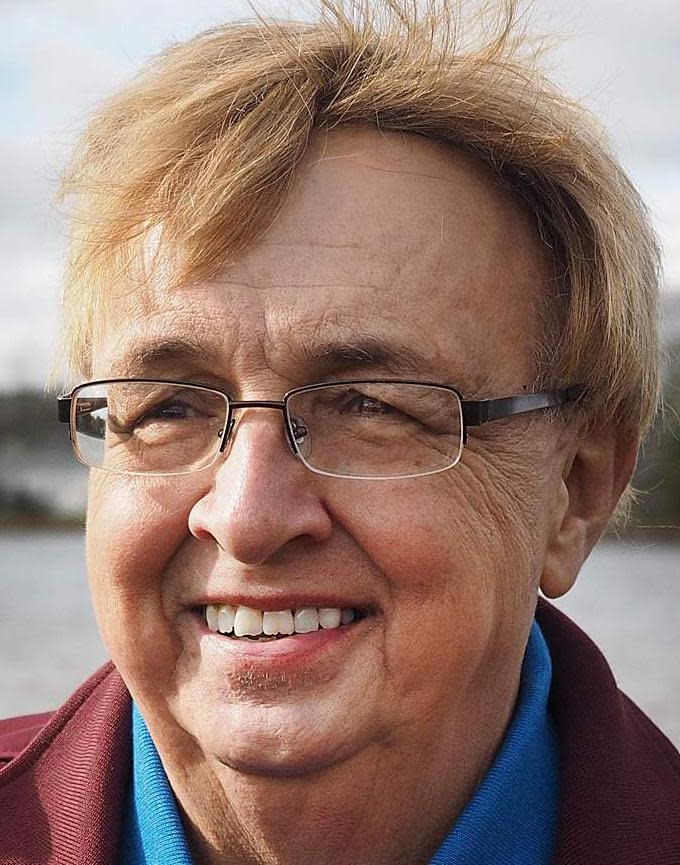Splaine: Thinking about Portsmouth's 'natural state' could help save environment
"Let me tell you about the birds and the bees and the flowers and the trees and the moon up above, and a thing called love." Those lyrics from "The Birds & The Bees," a 1964 solo by the great Jewel Akens, sums up today's topic. His song has been a favorite, and I sometimes sing it while driving along a quiet highway when no one can hear me.
"Natural state" is defined by those lyrics. Online, thefreedictionary.com does a good job defining that term as "a wild, primitive state untouched by civilization." Either definition offers the effect of natural state — it's about values we have, including making our environment a happy place for our wildlife — including animals, insects and plants. And cleaner air so we can see that moon.
Our environment is hurting. We're causing injury every day. Grass grows, providing food and oxygen to living things, yet we attack it, cut it, and pour chemicals on it. And those lawn mowers, which our state, cities, and towns use to cut grass on sides of highways and streets, absorb energy (i.e. taxpayer money), and throw pollution into our air.
More from Jim Splaine: Real affordable housing opportunities for Portsmouth

It's time to have serious discussions about what happens as we manicure and "beautify" our living environment. Do we need to water so much, throw fertilizer so often, and attack grass with spinning knives twice, three times, four times a month?
I became interested in the natural state approach when I traveled overseas. I'm not an international jetsetter, but I visited Russia in the early 1990s, and Croatia later that decade. I spent more than a week in each place, having the chance to walk around. I was amazed at the natural state of most private lawns, as well as around businesses and government buildings. In Europe and Asia, that's the norm.
A couple of weeks ago, a Facebook user, Kate Harris, posted a picture on the "Portsmouth, NH" Facebook Page which refers to Minnesota encouraging people to forgo pretty lawns in favor of wildflowers, clover and native grasses which are bee-friendly and don't need regular fertilizing or watering. Kate commented, "NO community can continue to waste precious water on lawns. They are mono-cultures that support nothing but outdated landscape notions. We are in a global crisis. We ALL need to do our part to conserve, defend and protect the natural world that is our lifeline. LOSE THE LAWN!"
More from Jim Splaine: NH will have the first primary in 2024. It's in our law books in ink, not pencil.
I shared her post on my Facebook page for anyone who would like to read comments from others, which include observations mentioning benefits of natural state: not having so much neighborhood noise pollution, not needing to use leaf blowers, and saving on the wear-and-tear, cost, gasoline and pollution of those giant rigs used by state and local governments to trim our highway and road grass. In many cases, that's unnecessary. In fact, not doing so can provide beauty of its own.
Let's think about how our environment is incredible, just as it is. Let's think about alternatives. There are healthier fertilizers. Less polluting ways of beautifying our homes and businesses. We can plant vegetables or wildflowers instead of having so much grass. We can water less.
Let's make a personal commitment to reduce our lawn cutting by 25% next year, letting some of it go uncut for the season? Then 50%? Perhaps Portsmouth, area communities, and our state of New Hampshire can take similar initiatives.
Let's think about our birds and our bees and our flowers and our trees and the moon up above.
More from Jim Splaine: Thinking about Pease — what's on top and underneath the surface
Today's quotes: "Synthetic fertilizers and pesticides don't make our yards healthy, they only treat symptoms. Organic land care practices give us healthy soil and healthy plants that resist pests and disease. Native plants need less water and fertilizer, and they support beneficial insects that feed birds and keep pests under control." — Ted Jankowski, former Portsmouth deputy city manager and Conservation Commission member.
"There's an even bigger picture here — the trees. Mature trees do more to capture and sequester carbon than any other organism on this planet. We need to do everything we can to care for the large trees in our community. They are nature's workhorses." — Kate Harris, Portsmouth environmental advocate. Her husband, City Councilor Jeff Ott, was a champion of tree preservation.
Next time: Thinking About "Philadelphia," the movie.
Jim Splaine has served variously since 1969 as Portsmouth assistant mayor, Police Commission member, and School Board member, as well as New Hampshire state senator and representative. He can be reached at jimsplaineportsmouth@gmail.com.
This article originally appeared on Portsmouth Herald: Splaine: Thinking about Portsmouth NH's 'natural state'

